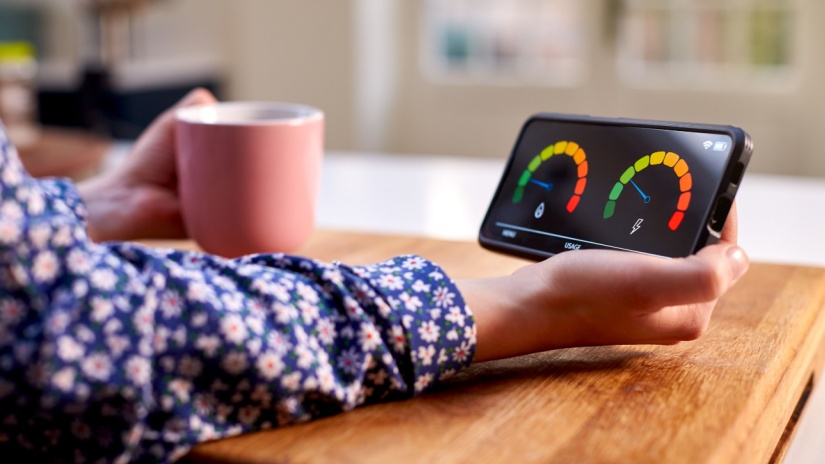Knowledge Centre
The ultimate guide to smart meters

The days of having a technician visit your home to read your electricity meter are fading away, thanks to the introduction of smart meters.
These advanced meters track your electricity consumption typically every 30 minutes throughout the day and it can eliminate the need for a meter reader by sending usage data directly to your provider.
This technology ensures that you are billed accurately for your actual usage, eliminating the need for estimated bills, which can prove unpredictable. It also provides you with detailed data, giving you the chance to find the most cost-effective energy deal for your needs.
What is a smart meter?
A smart meter is a digital device that tracks a home's energy use in intervals of at least 30 minutes. It then sends this data to the electricity retailer once a day. Unlike traditional meters, smart meters don't display this information on the meter itself, so accessing it requires a few extra steps.
Smart meters have replaced accumulation meters, which only measure total electricity consumption and require manual reading by a technician every few months. Interval meters, while an improvement, still need manual downloading and reading because it can't transmit data to the provider automatically.
A smart meter can offer more than just tracking your electricity use. It can:
- Help you benefit from solar power systems, solar feed-in tariffs, and solar battery storage.
- Allow remote control of electricity supply.
- Monitor power quality at your home.
- Notify distributors of power outages.
- Ensure accurate meter readings each billing cycle, so you're billed for your actual electricity usage.
According to recent data from the Australian Bureau of Statistics, living costs have risen significantly, prompting many Australians to be more vigilant about their finances. One effective way to manage electricity bills is by using a smart meter.
Being able to control your consumption habits is important while the cost of living is on the rise. Energy prices are also fluctuating, and smart meters can provide valuable information to help you regain control of your annual electricity costs.
However, not all households in Australia have access to these digital meters.
Smart meters by state or territory
In Victoria, smart meters have been mandatory for homes since 2006, so if you live there, you should already have one.
In New South Wales, Queensland, the ACT, and South Australia, only about 20-30% of homes have smart meters, so it's unlikely you have one, and Tasmania has a slightly higher adoption rate.
However, regardless of where you live, if you don't have a smart meter yet, you may be getting one soon.
The Australian Energy Regulator (AER) mandates that all new and replacement meters in these states and territories must be smart devices. So, if you're building a new home or need to replace a faulty meter, your retailer is required to provide you with a smart meter.
In Western Australia and the Northern Territory, smart meter rollouts are happening independently of the Australian Energy Regulator (AER).
Around 27% of Northern Territory meters are already smart, and all new and replacement meters there will be smart. In Western Australia, 42% of households in the main southern grid have smart meters, with plans for complete coverage by 2027.
While there are limited options to avoid a smart meter in most jurisdictions, these options exist.
How your smart meter works
Smart meters are devices that track your electricity usage and send this information to your electricity distributor.
The process differs depending on your state or the type of meter you have. In Victoria, smart meters measure your electricity use every 30 minutes and send this data to your provider. You can access this information through in-home displays, mobile apps, or web portals.
In other states, like New South Wales and Queensland, type 4 meters are more common. These meters also record half-hourly usage but only send data to distributors once a day. Your provider will then share this information with you.
How to read your smart meter
Unlike regular meters, smart meters cannot be manually read. Although it can track your electricity usage more frequently, accessing the information from your smart meter still requires an external process similar to traditional meters.
You can access this information online by logging into your account with your electricity provider. Some larger retailers, such as Origin, AGL, and EnergyAustralia, offer real-time usage information through mobile apps.
If you prefer not to check your mobile device or energy account for updates, you can install an in-home display. This device connects to your meter and provides real-time usage updates. Customers in Victoria can claim a rebate for these displays as part of the Victorian Energy Upgrade scheme.
How much does a smart meter cost?
Smart meter costs can differ significantly depending on your electricity provider. Some providers might waive upfront costs or installation fees for smart meters but include these costs in your bill in other ways.
Others might charge separate servicing and maintenance fees. It's important to talk to your provider about these costs and compare different options to find the best deal for you. Keep in mind that electricity providers charge different rates, and these rates can vary based on your location of service.
The benefits of smart meters
The advantages of having a smart meter go beyond just saving money. Understanding your energy usage can help you make informed decisions about energy plans and usage habits.
Insights into your energy usage
Smart meters provide detailed information about your electricity consumption, helping you identify areas where you can reduce usage and save money.
Fast responses to connection issues
Smart meters provide real-time usage data, allowing them to alert electricity distributors promptly to any connection or service issues.
Easy retailer switching
With smart meters, you can switch energy providers quickly, as the meter is read multiple times a day. This eliminates the long waiting periods associated with switching providers.
Faster outage detection
Smart meters allow providers to detect power outages and faults almost immediately, enabling quicker response times and restoration of power. Some energy providers offer free SMS alerts for outages in your area, helping you plan your day around potential disruptions.
Minimise manual meter readings
Smart meters can automatically transmit your household's energy usage to your electricity provider, reducing the need for manual readings. However, it's advisable to confirm with your provider if your smart meter requires any manual reading.
Communicating with customers
You might be surprised to discover that your smart meter can serve as a communication tool. If you have an in-home display, are registered for SMS alerts, or use an online account or app to view your energy information, your energy provider can send public warnings about major power outages in your area and the estimated time for restoration.
Timing your appliances
Smart meters allow you to schedule when your appliances start or turn them on remotely. This feature is particularly useful if you have smart devices and a Wi-Fi connection, as it helps you manage your energy usage efficiently.
How do smart meters help to save money?
Installing a smart meter can help you reduce your power bill if you're willing to adjust your energy habits. These meters record your energy use every 30 minutes, showing when and where you use the most electricity. This helps you identify activities and appliances that may be driving up your bill.
With live usage information and flexible time tariffs, smart meters allow you to tailor your energy usage and plan to save money.
While it doesn’t automatically lower your bill, it can suggest ways to cut costs. Switching to a flexible plan with time-of-use options lets you use more energy during cheaper off-peak hours.
This can be especially useful for homes with energy-intensive appliances like hot water heaters, pool pumps, dishwashers, washing machines, and dryers.
Can I get a smart meter if I’m renting?
If you're the account holder for the energy and no upgrades or electrical work are needed on the meter board, you can have a smart meter installed at your rental property without permission from the property owner.
However, if work is required on the meter board, you'll need to contact the owner, as they will be responsible for the costs. It's also wise to check your rental agreement to ensure there are no restrictions on installing a smart meter.
To maintain a good relationship with your landlord, it's a good idea to discuss installing a smart meter with them beforehand.
While meters are owned by the electricity network, landlords typically have a say in the type of meter used on their property.
Some retailers may install a smart meter without landlord permission, but installation can be more complex in buildings like apartments or townhouses. Discussing the switch with your landlord or building manager first is advisable.
Smart meters and solar power
A smart meter can help determine the appropriate size for a solar array by showing daily energy consumption. It also provides access to advanced electricity tariff structures, such as net metering, which prioritises self-consumption of solar energy before selling excess back to the grid.
However, a smart meter cannot provide detailed information on solar system output. It only offers a net assessment of energy usage from the grid versus energy exported. To monitor solar array output, efficiency, or the potential impact of a battery, additional technology is needed.
Is a smart meter worth it?
Smart meters represent the future of grid energy, and it's probable that other states will eventually mandate their use, following Victoria's lead.
Transitioning to a smart meter can be beneficial depending on your electricity usage, but it's important to pair it with the right tariff and plan for your home.
These meters have the potential to empower consumers by providing detailed information about their energy usage, making it easier to monitor and manage consumption, leading to potential savings on power bills.
Ready to talk?
If you’re looking to switch to an energy provider that supplies a smart meter, why not chat to one of our friendly Compare Energy team? We’re here to help.

